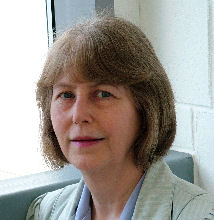‘We intend to feature a series of guest blog posts on UKOLN’s Cultural Heritage blog, which will provide an insight into the issues and challenges in providing innovative networked services from practitioners in the cultural heritage sector.
The first guest blog post comes from Catriona Cardie, Marketing Director, Our Dynamic Earth, who attended a workshop on blogging organised by UKOLN. In her post Catriona describes her interests in blogging and how the workshop helped her in recognising the advantages – and possible disadvantages – which blogs may have for museums.
Blogging. It’s A Black Art Isn’t It?
Around two years ago I was sent a business questionnaire on the role of ‘blogging’ as a corporate communications tool. I’ve been the marketing director with Dynamic Earth for over 5 years and am ultimately responsible for the delivery of visitors to Our Dynamic Earth. Our Dynamic Earth is the only centre in the UK to tell the life story of Planet Earth. While we do this in a consumer friendly, leisure based visitor centre we also provide a dedicated and specialist education service to over 50,000 schoolchildren from across the UK every year. We’re a not for profit organisation with lifelong learning in Earth Sciences at the heart of our business activity.
Despite being in the communications profession, I had no idea what blogging was, nor indeed what it could possibly offer me as a corporate communications tool. I confess that this whole new generation of networking frightened me a little but I duly put this on my ‘things to explore’ list, before dabbling round the edges of social networking. I chatted about blogging with colleagues and friends only to discover that what we all had in common was that none of us had ‘done’ it and that none of us could agree what it actually was.
When earlier this year I was approached by the Association of Scottish Visitors Attractions (ASVA) to provide a venue for a ‘blogging’ workshop’ I knew that not only would I be delighted to host but I would very much want to be there. And so began my blogging journey.
The workshop was hosted by Brian Kelly here at Our Dynamic Earth in November and was attended by around 35 representatives from ASVA membership, a diverse range of visitor attractions around Scotland. Only one of the attendees was an active blogger but we were all keen to establish how blogging could help us in our businesses.
Blogging Beginners
Confusion abounded as to the differences between social networking, blogging, online forums and chat rooms. To have Brian give a clear indication as to how these differ was in itself hugely illuminating, and actually something of a relief. Almost all of the attendees had some experiences of social networking and forums but most had negative experiences and could cite examples of how these had actually interfered or damaged their business.
Some attendees had experiences where staff or team members had inadvertently worked against the organisation via their social network sites. Examples included posting confidential information about the company, less than positive photographs of staff, comments about their employer or publicly available chat streams between employees.
These negative experiences were certainly serving to create a degree of suspicion about the potential of blogging.
Blogging Blues?
Brian did a great job in giving us a real time overview of blogging in action and within an hour of the workshop there was a palpable sense of revelation about the ease with which we could tap into blogs and blogging. Despite being clearer as to actualities of ‘doing it’ I was still left wondering if getting blogging to work for business as something of a black art.
As consumer businesses a number of key issues were common to the group.
These included:
- Subject matter – what should I blog about?
- Frequency – how frequently should I be blogging
- Will anyone out there read it – and how will I know
- How to promote your blog – how can I ensure I reach my ideal audience?
- Should blogging be ‘controlled’ – where does blogging and more traditional customer relationship management meet and to what degree should we control our messages and content
- Blogging and the ‘brand’ – what happens if blogging activity interferes with our brand position and undermines our key messages?
- Will we open ourselves to random feedback? – what are the chances of attracting the wrong kind of feedback and opening ourselves up to very random and negative content?
- Was there evidence that an investment in blogging would deliver a return? – We’re all commercial businesses and how can I justify blogging. After all it really needs to be of clear benefit to the business.
Blogging As A Business
What I learnt was that blogging is currently a marginal, and to some degree underground activity. But there is no doubt that this is a growing activity with a range of possibilities and opportunities. Personally I was astonished at the speed with which specialist could exchange information through a blogging network, and make this specialist knowledge widely available. This was clearly evidenced when Brian asked a question on his blog. Within seconds a really useful response, with further web references, had been returned.
I also learnt that within the next five years blogging will have made its way into the mainstream as a means of communications and networking. As a business we are very keen to be ‘dynamic’ and up to speed with the communication preferences of our customers.
Importantly I learnt that blogging is not about creating manufactured content intent on ‘selling’ to the audience. In my line of business this is a salutary point as my natural inclination is to clearly drive increased levels of business by promoting our products and services.
To this end my mind was racing with how we could tap into this particular communication tool while ensuring it was an activity that we would undertake with integrity and the appropriate levels of consideration but without the constraints of being overtly managed.
At this moment in time I have concluded that blogging would be an excellent communication tool in some areas of our business but inappropriate at this stage in others. I feel sure that the blogging can contribute as a corporate communications and marketing tool but that it is achieves these aims with greater subtlety and over a longer period of time.
While most of the workshop attendees were initially concerned with how blogging would impact on profitability I became less concerned with this as my understanding broadened. Instead, I can see a valuable role for blogging in delivering our educational remit. Indeed what a fantastic outlet for the specialist science knowledge we have on the team here at Dynamic Earth and what a way to share, augment and grow that knowledge. What a great communications medium for the teachers and learning professionals that we work with and what a great means of collecting feedback, hints, tips and signposts to new science, news ways of delivering and communicating our science.
And perhaps most importantly what a great way to deliver additional value to our education based customers and ultimately grow our reputation as a leading provider of Earth and Environmental science communication.
Will Our Dynamic Earth Be Blogging In 2009?
Certainly, Brian’s workshops helped me to discover that successful blogging isn’t as black an art as I had at first suspected. In fact I now consider it another outlet and feedback tool that can be successfully added to the range of our business communications tools. Where’s that questionnaire now?
Here at Dynamic Earth we left the workshop not only with a clear picture of how to start our blogging journey but very excited, almost evangelical, about blogging. I thoroughly enjoyed the workshop which itself was educational and fun – everything we aspire to be here at Dynamic Earth. Brian has me absolutely converted and I am becoming a bit addicted to blogs though have so far held back from jumping in with a Dynamic Earth blog. But, look out for a fantastic new Earth and Environmental Science, a blog sometime in 2009!
Catriona Cardie, Marketing Director, Our Dynamic Earth, <www.dynamicearth.co.uk>



